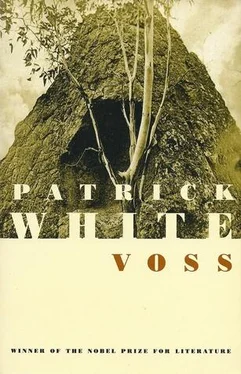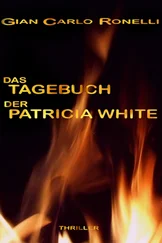Sometimes Palfreyman would leave Le Mesurier to bring on their mob of mules and horses, and ride ahead with the apparent intention of joining Voss. Then, keeping a discreet distance, he would wait for his leader to call him forward. But the German would not. He despised the ornithologist, for obvious reasons, which Palfreyman himself knew. Of rather delicate constitution, failures of this nature, together with the pains of prolonged travel, would often cause the latter to suffer tortures. So he would force upon himself all kinds of menial tasks, as penance for his disgraceful weakness. He would scour the fat from their cooking utensils with handfuls of the dry, powdery earth; he would strain the scum from any water they found; he even treated Turner, who had broken out in boils, presenting an appearance of the most abject human misery.
All this the ornithologist taught himself to endure, and the voice of Voss saying:
‘Mr Palfreyman, in his capacity of Jesus Christ, lances the boils.’
Mercifully, such incidents could occur only at their resting-places, dubious oases in the shimmering plain of motion. For the most part, personal feelings were numbed by the action of the animals that carried the party on.
Behind the spare horses and the pack-mules would stumble the few skeletons of cattle, with Judd in attendance, and Harry Robarts. The convict could coax a flagging beast most marvellously. These shocking steers and one or two udderless cows would have laid down long ago, if little reflections of the man’s will had not continued to flicker in their fixed eyes. As from his cattle, the beef had dwindled from the man, but he was still large, because big-boned. Heavy, too, he would change horse frequently, to rest the back of the one he had been riding. If his frame appeared to have suffered less than that of any other human member of the expedition, undoubtedly this was because his earlier life had tempered it. His mind, moreover, had returned to his good body, and was now in firm possession, devoted to all those objects on which the party was dependent, as well as to the animals in his charge.
Judd remained, besides, intensely interested in natural forms. For instance, he would pick at the black fruit of trees to release the seed; with the rough skin of his hand, he would rub a hot, white bone, whether of man or animal, as if to re-create its flesh; he would trace with the toe of his boot a footprint in the dust to learn its shape and mission. Afterwards, he would climb back upon his horse, and sit there looking indestructible. Seldom did the action of the sun reduce him to dreams of the future. Judd, it would sometimes appear, was himself an element.
Once Voss and Jackie had discovered in some trees a platform of leafy saplings fastened together with strips of bark. They were still examining it when Judd and Harry caught them up.
‘These dead men,’ the native boy explained, and it was gathered that his people laid their dead upon such platforms, and would leave them there for the spirits to depart.
‘All go,’ said the blackfellow. ‘All.’
As he placed his hands together, in the shape of a pointed seed, against his own breast, and opened them skyward with a great whooshing of explanation, so that the silky, white soul did actually escape, and lose itself in the whirling circles of the blue sky, his smile was radiant.
Those who had heard and witnessed were thoughtful as they rode on. It was easy in that landscape to encourage thoughts of death.
But the thick Judd, whose own soul had achieved fulfilment not by escaping from his body, but by returning to it, preferred to interpret the aboriginal illusion in terms of life. He who was wedded to earthly things would often invoke them as he rode along, and so, on the day they began to climb those quartz hills, he was thinking of his wife, who smelled of bread and soap, and who had the mole beside her nose, with the three little hairs sprouting from it. This he now saw with wonder, and much more from the years they had lived together, before he woke. Yet, he had got life in his sleep. His sons were evidence enough of that. Golden-skinned, they galloped the horses bareback down to water, and folded sheep at smoky dusk, and cut the lambs’ tails in season, with the blood spurting in little fountains into their laughing mouths. Suddenly his ribs were aching, and the welts of old punishment. The cat of love smote him in the hands of his great sons.
In his craving for earthly love, Judd struck the stirrup-iron of Harry Robarts rather roughly with his own, and bruised Harry’s knee with his, for they were riding side by side.
‘Move over, son,’ the man complained. ‘You are riding that close we will be joined for ever at the stirrup-irons.’
The boy lowered his eyes, and removed himself.
‘It was not a-purpose,’ he sulked.
‘Whichever way, it is not safe,’ said Judd.
He had developed an affection for the sawney boy. It was out of pity, so he explained it, and in camp would cut for him choicer bits of starved mutton, or dried beef, and put them on the lad’s plate, and go away. Formed by circumstances, their relationship remained upon the whole respectful, although the boy was inclined to accept it for want of a better, and the man, often impatient, was sometimes even contemptuous of his mate.
Now, as they rode together, it appeared that the boy was still thinking of the tree-platform recently discovered, and of the migration of aboriginal souls, for he murmured tentatively, dreamily:
‘Did you notice it go, Mr Judd, when Jackie opened his hands?’
‘Notice what?’ asked the man.
‘It was a white bird, like, very quick.’
‘Now, you have been seeing things,’ said the man.
The boy sniggered, and slapped at his horse’s withers with the bundle of reins.
‘Did you not see?’ he persisted.
‘ Nao! ’ said the man.
Then a steer stumbled, and fell, and they pushed and kicked it to its feet again. When it was walking, Judd resumed their conversation.
‘You had better tell Mr Voss of this here experience of yours, Harry, with birds. It would interest him.’
For, if wax has to be wax, then it is difficult to resist a squeeze, and Judd was only human.
‘Not Mr Voss,’ said Harry. ‘Not on your life.’
‘Mr Voss would understand such things,’ smiled Judd.
‘That is why I would not tell him.’
‘Or he would take it out on yer for ever.’
‘Yes,’ Harry replied.
It was obvious that all possibilities were contained for him in the single form of Voss.
Judd had become as silent as a piece of leather. He would have liked to give the boy a present, and remembered a magnifying-glass with ebony handle that he had kept for years, in a shammy leather bag, in a box.
They were riding and drowsing in perpetual dust, and stumbling on the rocky sides of the hills they were ascending, when Judd reached over and grabbed something from the trunk of a tree.
‘There you are, Harry,’ he said, and offered his closed, hairy hand. ‘There is a present for yer.’
In the absence of ebony he was forced to such measures.
‘What is it?’ asked the boy, advancing his own hand, but cautiously.
‘No,’ laughed Judd, blushing under dirt. ‘Open your mouth, shut your eyes.’
Then, when his suggestion had been followed, he popped a little lump of gum into the lad’s open mouth.
‘Aoh!’ cried Harry, wrinkling up.
‘No,’ insisted Judd. ‘Go on.’
He was putting into his own mouth a similar knot of gum, to demonstrate his faith in the token, or else they would both die of it.
So they rode, and sucked the gum, which was almost quite insipid in flavour, if slightly bitter. Yet, they were both to some extent soothed and united by its substance and their act, and were prodding the rumps of the broken cattle gently with their toes, as they rode back and forth in their oblique ascent of the glaring hill, until the boy glanced up, and there was Voss, looking not at him, but forward into the distance from a crag.
Читать дальше












